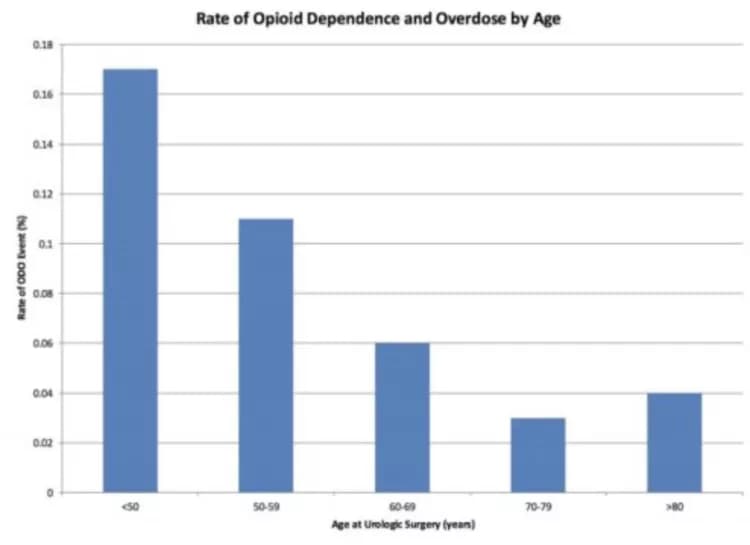
Urologists Voice Concerns About Opioid Dependence In Postoperative Patients
Drug overdose was the leading cause of accidental death in the U.S. in 2015. Although pain management after surgery continues to rely on opioids, there are concerns that ubiquitous use of opioids has led to a growing epidemic of addiction, dependence, and overdose (ODO). In a new study in The Journal of Urology®, researchers investigated to what extent patients who had undergone urological surgery later became opioid dependent or overdosed. Although the overall risk was low (0.09%, about 1 in 1,111 patients), several risk factors for ODO were identified.
According to the study results, risk factors for ODO include younger age, inpatient surgery and increasing hospitalization duration, baseline depression, tobacco use, and chronic obstructive pulmonary disease. In addition, insurance provider, Medicaid or Medicare enrollment, and noninsured status were factors associated with ODO risk. The investigators also correlated ODO rates to specific urological surgical procedures, with stone procedures (0.15%) or major renal surgery (0.12%) having the highest rates, and major pelvic surgery (0.03%) and inguinal/scrotal procedures (0.05%) having the lowest rates.
"Using these risk factors, we can identify patients at the highest risk for ODO, and tailor specific pain and followup regimens for them that carry the least consequences," explained lead investigator Gopal N. Gupta, MD, of the Department of Urology, Loyola University Medical Center. "Perhaps the greatest and most rapid impact can be made if physicians reduce over prescription of opioids and seek alternative pain management strategies. Vigilant monitoring of aberrant behavior such as early refill requests, treatment noncompliance, and reports of lost or stolen prescriptions will improve the recognition of signs of abuse."
Using data from 2007 to 2011 for more than 675,000 patients from the Healthcare Cost and Utilization Project (HCUP) for California that included information on patient discharge, outpatient surgeries, and emergency department records, researchers were able to link surgical records to postoperative diagnoses of ODO occurring within one year of surgery.
Comparing patients in whom ODO did or did not occur, those who overdosed were younger (median age 50 vs 62 years), more likely to be Caucasian (63.4% vs 57.3%) or African American (9.5% vs 3.6%), and less likely to have undergone ambulatory surgery (18.0% vs 57.8%) compared to patients who did not overdose. Patients who overdosed were more likely to have been diagnosed with depression (15.0% vs 3.4%) or be a tobacco user (28.2% vs 15.7%), and less likely to have cancer (17.2% vs 22.8%).
For patients younger than 65 years who were on Medicare or Medicaid, and individuals who self-paid for insurance, the risk of ODO was 2.1 to 3.0 times higher than patients with private insurance. Medicare patients 65 years old or older were not found to be at increased risk for ODO.
In a Commentary in the same issue, Michael S. Leapman, MD, of the Department of Urology, Yale University School of Medicine, and Steven A. Kaplan, MD, of the Department of Urology, Icahn School of Medicine at Mount Sinai, offer some perspective on separating fact from fiction about opioid use in urology.
"Opioid prescription is as deeply entrenched in the rituals of surgery as the act of donning gown and gloves. The ability to perform surgical interventions has always depended on the availability of analgesia, and opioids have long represented an indispensable component of care," they write. Yet, with many studies showing the variation and extent of high dose opioid prescriptions and persistent use after surgery, there is a concern that urologists might be contributing to the opioid crisis.
Drs. Leapman and Kaplan note that the study suggests that even brief exposures to opioids may result in problems for a minority of patients. But they also suggest that there are physicians who routinely dispense doses well in excess of recommended safety thresholds, patients who obtain multiple prescriptions within short periods ("doctor shopping"), and a confusing set of messages about pain management over recent years.
Dr. Leapman and Dr. Kaplan recommend that, "As attitudes toward opioids are rapidly changing, a balance must be struck between highly restrictive and overzealous prescribing. In light of sobering national statistics of misuse, all clinicians are tasked to embrace responsible prescribing. A middle ground appears possible that reeducates toward demystifying dosing strategies, maximizing patient safety, and preserving a clinician's judgement."
Materials provided by Elsevier. Note: Content may be edited for style and length.
Disclaimer: DoveMed is not responsible for the accuracy of the adapted version of news releases posted to DoveMed by contributing universities and institutions.
References:
- Arpeet S. Shah, Robert H. Blackwell, Paul C. Kuo, Gopal N. Gupta. (2017). Rates and Risk Factors for Opioid Dependence and Overdose after Urological Surgery. The Journal of Urology. DOI: 10.1016/j.juro.2017.05.037
- Michael S. Leapman, Steven A. Kaplan. (2017). Separating Opioid Fact and Fiction in Urology. The Journal of Urology. DOI: 10.1016/j.juro.2017.08.064
Related Articles
Test Your Knowledge
Asked by users
Related Centers
Related Specialties
Related Physicians
Related Procedures
Related Resources
Join DoveHubs
and connect with fellow professionals

0 Comments
Please log in to post a comment.